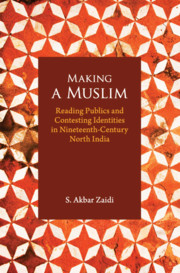3 - Main majbūr hu’ā: Print Matters
Published online by Cambridge University Press: 24 March 2021
Summary
Altaf Husain Hali in his biography of Mirza Ghalib writes, ‘After Mirza had finished Dastānbū and was still faced by the same solitude and loneliness, what else could he have done except to consider his inkpot and pen his friends and companions, and read and write something to deal with this loneliness and amuse himself/pass the time’ (Ab bhī tanhā‘ī aur sannāte kā vahī ‘ālam rahā, is vaqt siwā is ke aur kyā chāra thā ke dawāt aur qalām ko mu‘nis aur rafīq samjhen aur kuchh likh parh kar apnā gham ghalat karen aur dil bahlā’ in). Hence, seemingly in boredom when Ghalib did not have much to do and did not leave his home in the years following the Rebellion, he decided in 1859/60 to write a commentary on a famous Persian dictionary called Burhān-i Qat‘i (Conclusive Proof). The text was written in 1652 at the court of Sultan ‘Abdullah Qutb Shah (r. AH 1036–83/AD 1626–72) in Golkonda by Muhammad Hussain Tabrezi, who used the pen name Burhān. Ghalib republished it with some amendments in AH 1277 (AD 1860/61) under the title Dirafsh-i Kāwiyānī (The Banner of Kawa). Hali writes that Ghalib's corrections of the dictionary brought forth numerous responses, and lists four titles and adds a va-ghaira chand risāle (a few other miscellaneous magazines), adding that Ghalib replied to many of those who had written their critique. Many argued that Ghalib had incorrectly read the Persian and was not familiar with the context of the original. One reason for Ghalib's purported inability to do justice to this work was that, as he himself had admitted, he did not have access to many other dictionaries that were required for such a task. Hali explains why it was that there was so much reaction to Ghalib's commentary.
The only way the depressed and distraught purāne ta’ līm-yāfta (those educated in an older order/style) unknown (gum-nām) people, who had no means to acquire fame except respond to and reject the book of a learned and famous man, and to show to the world, that they too were worthy of something (ham bhī ko’ī chīz hain).
- Type
- Chapter
- Information
- Making a MuslimReading Publics and Contesting Identities in Nineteenth-Century North India, pp. 120 - 170Publisher: Cambridge University PressPrint publication year: 2021



